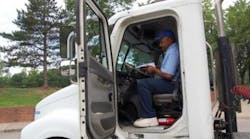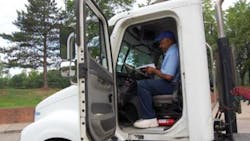Trucking hopeful CDL committee will set standards, improve rulemaking process
As far as federal government acronyms go, ELDTAC is standard issue and unwieldy. Many in trucking, however, are hopeful that those six letters will help spell out a long-overdue driver training standard—and might even lead the Federal Motor Carrier Safety Administration (FMCSA) toward a user-friendly revamp of the way regulations are developed.
ELDTAC stands for the Entry-Level Driver Training Advisory Committee, and its members have been recently chosen by FMCSA from a field of experts in their respective fields, including motor carriers, drivers, DMV training organizations, state enforcement agencies, labor unions, and safety advocacy groups.
FMCSA has brought the committee together for the agency’s first run at a negotiated rulemaking, or reg-neg, to use the inside-the-beltway parlance. Simply, the agency hopes industry stakeholders can sit down together and hammer out a driver training proposal that quickly can be turned into a rule—and, ideally, one that will end up improving safety rather than in litigation.
With regard to that membership roster, ELDTAC is not unlike MCSAC, the Motor Carrier Safety Advisory Committee. But whereas the latter tends to be “contentious,” the new group is expected to be much more “collaborative,” say trucking representatives who sat in on the organizational sessions earlier this month.
“At least at this stage, there’s a unified feeling that this is something that needs to be done, that this is long overdue,” Ryan Bowley, director of government affairs for the Owner-operator Independent Driver Assn. (OOIDA), told Fleet Owner. “This is much more a working committee versus just a messaging committee. MCSAC can get off the rails pretty quickly, but because this is an ad hoc group, for this real purpose, that’s a real positive.”
While the early sessions were devoted to laying out the ground rules and establishing subcommittees, there’s already been some good discussion about defining just what an “entry-level driver” is and does, and how the licensing process works currently.
Key areas of focus are expected to be whether the training requirements are going to be based on a certain number of curriculum hours or on skills performance, and training accreditation.“I don’t think there were really any fireworks,” said committee member Boyd Stephenson, director of commercial driver licensing policy for American Trucking Assns., referring to the organizational sessions. “Now we really have the opportunity to dig into the meat of the proposal.”
Both ATA and OOIDA support performance-based training, as well as school standards.
“We don’t wabt a program that says ‘40 hours and you’re done,’” Stephenson said. “The problem is there’s nothing out there governing the way training is done. We want a program that says, ‘you’ve got to be able to do 1-2-3-4-5 things.’ If you can do those quickly, great. If you can’t, you never finish—which is a good way to keep some unsafe people off the roads.”
But the biggest challenge, the “cause of the greatest consternation” and past delays in setting the standards is coming up with plan that’s worth the cost.
“That’s going to be a big focus,” Bowley said. “Hopefully, there will opportunities to look at that with a lot more depth than the agency had in the past.”
Both Bowley and Stephenson emphasized that the reg-neg’s collaborative approach to rulemaking has been used elsewhere in the Dept. of Transportation and extensively by the Dept. of Education.
“There’s definitely a place for it, and maybe this will be the beginning,” Stephenson said.
Don Lefeve, president of the Commercial Vehicle Training Association, says now that the basics are out of the way, the committee must “roll up their sleeves and get down to work.”
“I believe the participants understand the tough task ahead and realize that we need to produce a rule,” Lefeve said. “While there are many challenges which lie ahead, the first session ended on a positive note. I remain optimistic the committee will be able to produce a rule by the end of May."
OOIDA’s Bowley accentuated the positive as well.
“We’re very optimistic—cautiously optimistic,” said Bowley. “Overall, there are a good group of members. There’s a good feeling that this is a process that may not get every question answered, but certainly should advance the ball far enough so the agency can put together a proposal that will improve safety on the highways and training within the industry.”





